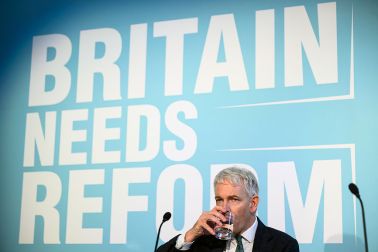Lockdowns cannot kill off a virus — they just delay the spread. There was always going to be a new wave of infections as Boris Johnson phased out restrictions. The question was how big it would be and how much protection the vaccines would provide. Chris Whitty, the chief medical officer, summed up the case for optimism a few months ago, saying that any ‘new surges will meet a wall of vaccinated people’. His theory is now being tested: the fast-spreading Indian (Delta) variant is making its way through the most vaccinated country in Europe. What to do? And how worried should we be?
Since the pandemic began, I have been trying to answer such questions. I’m a professor of risk management at the University of Bristol, not an epidemiologist. Using mathematical principles I have been able to estimate the trajectory of Covid, with results regularly published on The Spectator website. In a field marked by vast uncertainty and monstrous error margins, the record of my modelling has been pretty good — each week it has been retrospectively validated by the latest Covid report from the Office for National Statistics. In recent weeks, I have been modelling the third wave: infections, deaths and herd immunity. I can’t say that it offers good news. But it offers a guide to the main issues we face.
We ought to brace ourselves for a surge of infections, one that has started already and may be greater than the wave seen in January. But crucially, the NHS should not come close to being overwhelmed. Cases will be mainly among the young, who are far less likely to get seriously sick — so daily deaths will run at a quarter of what they once did, before subsiding. There is no point delaying reopening, because a landmark has been reached: Covid-19 has been downgraded into a nasty bug which is now no more lethal than viruses such as influenza. My model points to about 7,000 more deaths to come. A daunting figure, yes, but about a third less than in a typical flu season.
Modelling has acquired a pretty bad name during this pandemic. But I’ve gone for the simplest model able to track how the virus is behaving, called the Predictor Corrector Coronavirus Filter (PCCF). It is inspired by the work of two brilliant Scots: the mathematical epidemiologist Anderson McKendrick and the biochemist William Kermack who applied mathematics to medical problems almost a century ago. They showed how much you can do by keeping it simple and looking at just three factors: the size of population, the average time taken to pass an infection on, and the number of people infected by each patient.
Neil Ferguson and his team — along with the other Sage members — have pursued complicated models requiring the input of far more variables (academically pleasing, certainly, though it increases the potential for error). But the Indian variant, which now accounts for most Covid infections, has changed everyone’s calculations. Back in April, my model pointed to a fairly negligible rise in infections after lockdown. Not any more. I assume someone with the Indian variant will pass it on to 6.8 others in a fully susceptible population, a far higher multiple than the Kent variant (4.5 others) and the original (three others).
If the Indian variant does spread this quickly (my estimate is in line with the figure quoted by the government) then it would quickly seek out the one-in-three Britons who are still susceptible: mainly the not-yet-vaccinated. My model shows an enormous final wave, peaking during the middle of next month at anywhere between two million and four million active infections. So we could well be in for even more Covid infections than in the January wave which forced us into a third lockdown.
There is no hiding place. Either you’ve been vaccinated or you are pretty likely to get Covid this summer
How can this be, you might ask, given the success of vaccination? Because it will spread among the young. Only about a third of the under-forties have been jabbed so far, with just 14 per cent double-jabbed. A good number (my model estimates about one in five) will not come forward to be jabbed at all. We may have protected those most at risk — but the young, who are least likely to be seriously ill, are still susceptible. There are more than enough of them to facilitate a third wave of Covid cases that will be far bigger than the second.
For weeks, Britain has enjoyed the lowest Covid levels in Europe. But we should brace ourselves for worrying headlines. Holiday plans could be affected: countries that are (rightly) fearful of the Indian variant may well want to restrict entry to people from the UK. There will be cries to lock down again. By my estimates, the R-number (the rate of growth of the virus) is already higher than when the Kent variant was at its peak.
But the virus just isn’t translating into hospitalisations and deaths in the way it once did. Take Bolton. Its third wave, which happened last month, saw the number of confirmed Covid cases surge back to where it was in January. But crucially, teenagers and children accounted for about half of these infections. The over-sixties (those most likely to get ill) accounted for just 3.5 per cent of them. It is too early to speak with any finality about deaths from Bolton’s third wave, but the number of Covid patients in hospital did not get above a third of the January peak. So Bolton offers a useful guide to what we can expect in Britain’s third wave: a significant number of cases, but mainly among the young, who mostly will emerge unscathed.
In the third wave, just under half the deaths will likely occur in the over-eighties — and the peak death rate per day will be less than a quarter of what it was in January. In other words, the Covid death toll for the whole of the third wave could be less than it was in just one of the middle weeks during January — and far less than we can expect from the flu. It is also worth noticing another trend: those who have recently been in hospital with Covid are younger and are out sooner. After ten days, 75 per cent of patients have been discharged, compared with 40 per cent earlier in the pandemic.
But say my modelling on the virus’s transmissibility is an underestimate, and the Indian strain is, in fact, far more transmissible. What then? Professor Ferguson, for instance, has suggested every infected person infects nine others: I assume 6.8. But according to my model, virtually everyone who is not immune is likely to catch the virus anyway, because of the level of mixing taking place. In other words, the death toll will essentially be unaltered even if the variant spreads far faster than anticipated. Crudely put, if my sums are right, there is no hiding place. Either you’ve had the virus or been vaccinated, or you are pretty likely to get Covid this summer.
We are not told what Sage models are being shown to the Prime Minister. Sir Patrick Vallance, the chief scientific adviser, has reportedly delivered a ‘downbeat’ briefing of ‘fairly grim’ data. So we can assume it will be along these lines. The goal of herd immunity, too, may seem further away. When the pandemic started, Sir Patrick was saying this could be achieved when about 60 per cent of the population had been infected (or vaccinated). At Easter, I put the figure at about 78 per cent. Now, I would raise that to 85 per cent. But Covid does not vanish overnight when the herd immunity threshold is hit. Its growth simply decelerates — and my model shows it will still infect pretty much everyone who is susceptible.
What is the alternative? If we lock down from now to the end of August, to allow all adults to be jabbed at least once and give the vaccine enough time to mature, we can still expect a very large spike in infections in September because children will not have been inoculated. Reopening in September would push the Covid spike into the start of the flu season — and put strain on hospitals in a way in which a summer one will not.
This is, of course, a model and models are only approximations to reality. As one of the great pioneers in applying mathematical models to real-life problems, my friend and colleague, the late Ludwik Finkelstein (father of Times columnist Daniel) wrote: ‘To treat effectively the complexity of real systems, the models used are highly abstract. They idealise and omit detail.’ And there is still much detail that we don’t know. How quickly will the young be vaccinated, and how strong will their immune response be to one dose? How effective are our existing vaccines against the Indian variant? Will the summer weather reduce transmission? And what about long Covid? My figures may be too pessimistic. I certainly hope so.
But what my model shows is that even if the Indian variant is as infectious as people say — and we end up with millions more new infections — the NHS will not be overwhelmed. The vaccines have seen to that. Let’s not forget that the third wave will also be spreading immunity. Once it has passed (which looks set to happen by the end of August) we could be looking at 95 per cent immunity — a pretty good protection against any fourth wave. There may be little incentive to vaccinate school-age children.
My estimate of millions of new infections might look daunting. No one wants to think that millions of Britons will soon acquire the virus or that thousands more may die. My point is that Professor Whitty was right: a third wave of Covid is indeed meeting a wall of vaccinated people. These people can carry on with their lives.
On Monday, the Prime Minister could decide to take the final step out of lockdown on 21 June — and allow us all to mix as freely as we did before the pandemic started. Some are advising him to keep several restrictions after this date. Perhaps the one-metre social distancing advice, perhaps the work-from-home orders (ignored by the 60 per cent of Britons who are going to the office as per usual). But the model shows that the virus is growing exponentially already; the final step on the roadmap out of lockdown makes little difference.
We are already mixing about as liberally as we would otherwise do on a full reopening. Not out of carelessness but, perhaps, out of an acceptance of risk. Regardless of which course of action we take this month — stay as we are, fully reopen or delay until the end of August — we will have to get through an exit wave. But one which, thanks to the vaccine, no longer carries the danger that it once did.






Comments